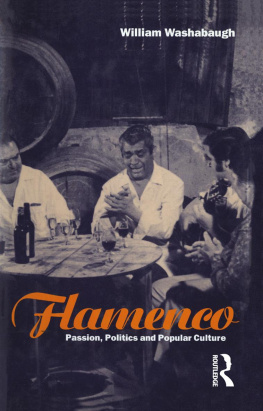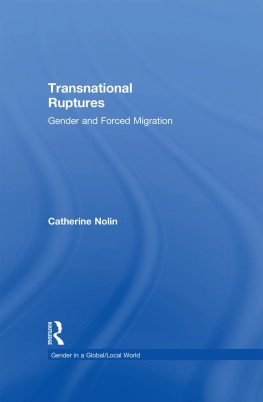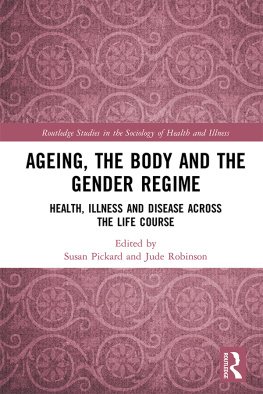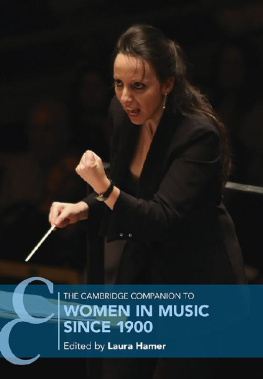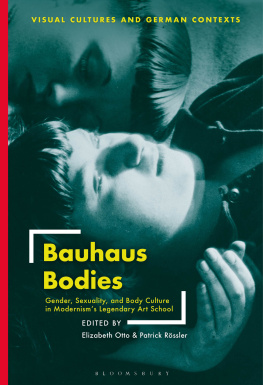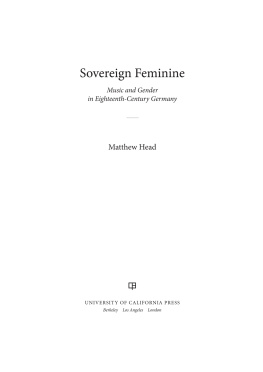The Passion of Music and Dance
The Passion of Music and Dance
Body, Gender and Sexuality
Edited by
WilliamWashabaugh
First published 1998 by berg publishers
Published 2020 by Routledge
2 Park Square, Milton Park, Abingdon, Oxon OX14 4RN
605 Third Avenue, New York, NY 10017
Routledge is an imprint of the Taylor & Francis Group, an informa business
Copyright William Washabaugh 1998
All rights reserved. No part of this book may be reprinted or reproduced or utilised in any form or by any electronic, mechanical, or other means, now known or hereafter invented, including photocopying and recording, or in any information storage or retrieval system, without permission in writing from the publishers.
Notice:
Product or corporate names may be trademarks or registered trademarks, and are used only for identification and explanation without intent to infringe.
Library of Congress Cataloging-in-Publication Data
A catalogue record for this book is available from the Library of Congress
British Library Cataloguing-in-Publication Date
A catalogue record for this book is available from the British Library
ISBN IA 978-1-8597-3909-9 (pbk)
Typeset by JS Typesetting, Wellingborough, Northants.
Contents
William Washabaugh
William Washabaugh
William Washabaugh
Timothy de Waal Malefyt
Donald Castro
Jeffrey Tobin
Marta E. Savigliano
Gail Holst-Warhaft
Angela Shand
Susan C. Cook
Gerhard Steingress
Guide
This collection of essays in comparative social history grew out of the papers that were presented at the 1996 meeting of the American Anthropological Association in a session entitled 'The Politics of Passion.' The idea for this exploration of the politics and ideology in flamenco, tango and other popular styles had occurred to me a number of years earlier, but my discussions with Gerhard Steingress in 1994 and 1995 helped to advance it by leaps and bounds - Gerhard's Sociologia del Cante Flamenco (1993) ends with a discussion of flamenco, tango, rebetika, and csrds. This present collection of essays, written by some of the world's most knowledgeable students of flamenco, tango, rebetika, and North American popular music, makes giant strides forward in our quest to understand the complex interweaving of gender, politics, music, and dance in modern life while simultaneously opening the way for future explorations of these phenomena.
The essays by Donald Castro, Gail Hoist-Warhaft, Timothy deWaal Malefyt, Marta Savigliano, Jeffrey Tobin, and Susan Cook are revisions of the presentations they made at the San Francisco meeting. Gerhard Steingress, Angela Shand and I were involved in the organization of the session from its inception, Angela and I assisted at the presentations, participated in subsequent discussions, and contributed our editorial efforts to the present volume. Discussions with David Monroe enhanced my own essays. My wife Catherine talked me through a great number of intellectual and organizational knots. I thank all these people, but especially Catherine, for their participation in this project.
W. Washabaugh
Donald Castro is Dean of Arts and Humanities at California State University at Fullerton. He has written numerous essays on the social history of tango and is author of Tango as Social History 1880-1955 (1991).
Susan C. Cook is Associate Professor of Musicology at the University of Wisconsin-Madison. She co-edited Cecilia Reclaimed (1991).
Gail Holst-Warhaft is a lecturer in classics at Cornell University and has written extensively on rebetika, notably, The Road to Rebetika (1977), and Theodorakis: Myth and Politics in Modern Greek Music (1979). Her most recent book is Dangerous Voices: Women's Lament and Greek Literature (1992).
Timothy deWaal Malefyt completed his doctoral dissertation, "Gendered Authenticity: The Invention of Flamenco Tradition in Seville, Spain," at Brown University. He is currently a Senior Account Planner in Advertising.
MartaE. Savigliano is Associate Professor at UCLA in the Department of World Arts and Cultures, and is married to Jeffrey Tobin. She is the author of Tango and the Political Economy of Passion (1995).
Angela Shand is studying the history and practice of Greek dance as a graduate student of anthropology at the University of Wisconsin-Milwaukee.
Gerhard Steingress is professor of Sociology at the University of Sevill e and associate of the Fundacion Machado. He authored the books Sociologia del Cante Flamenco (1993) and Cante flamenco: Zur Kulturkritik der andalusischen Moderne (1997) as well as numerous essays on flamenco art and collective identity.
JeffreyTobin is a cultural anthropologist teaching in the Department of World Arts and Cultures at UCLA. His contribution to this volume is taken from his doctoral dissertation, "Ethnographic Interventions in the Manly Culture of Buenos Aires," completed at Rice University.
William Washabaugh is Professor of Anthropology at the University of Wisconsin-Milwaukee. He co-edited The Social Context of Creolization (1983), and authored Five Fingers for Survival (1986), Speak into the Mirror: A Story of Linguistic Anthropology (1988), and Flamenco: Passion, Politics, and Popular Culture (1996).
Introduction: Music, Dance, and the Politics of Passion
WilliamWashabaugh
Popular music and dance are about changing the world. Such has been the case since the 1790s when modern life was formed out of the cultural crucible of the French Revolution, Then, as now, the energy of music and dance was shifted away from praising God and entertaining kings, and toward the reputedly more important tasks of contacting reality, locating wholeness, and rebuilding the tracks along which any good society should move. During this same post-Revolutionary period, the term 'popular' began operating as a kind of neon sign for marking the place where stars are made, tickets are sold, endorsements are secured, identities are created, and where cities, states, and nations are emboldened by the sounds of their own musical souls. And if these latter aspects of 'the popular' seem strange bedfellows for the former, then we have succeeded in outlining the problem at hand: popular music and dance are puzzlements, full of self-contradictions. They are treated with churchgoing respectfulness (Gay 1995: 18; Johnson 1995), yet they overflow with licentiousness and banality. They are firmly stitched into the economic and political fabric of a this-worldly existence, but they persistently stretch and strain towards ecstasy and transcendence.
More confusingly still, popular music and dance became knotted with gender and nation in the nineteenth century, a knot that tightened as patriarchal regimes of the old order came unraveled. In the new modern order of things, womanhood and nation became tightly wedded, the former being the master trope for the latter (Parker et al. 1992: 6; Kittler 1991). 'Nation' was then understood in feminine terms, as the nurturing fundament of social life, source of all warmth and security. 'In 1800 the system of equivalents Woman=Nature=Mother allowed acculturation to begin from an absolute origin' (Kittler 1991: 28). Womanhood became the rock on which nations were built. Not for nothing are nations referred to with feminine pronouns and their languages are called 'Mother tongues.' Accordingly, womanly sounds and womanly movements came to symptomatize the vital soul of 'a people.' More than just 'Mother', it was 'Mother-at-song' that knotted the knot of modern political life, creating the modern triad of nation-gender-music that changed the world while simultaneously mystifying it. Hence, our scholarly attentions are directed to the matters of politics, gender, and popular song and dance.


